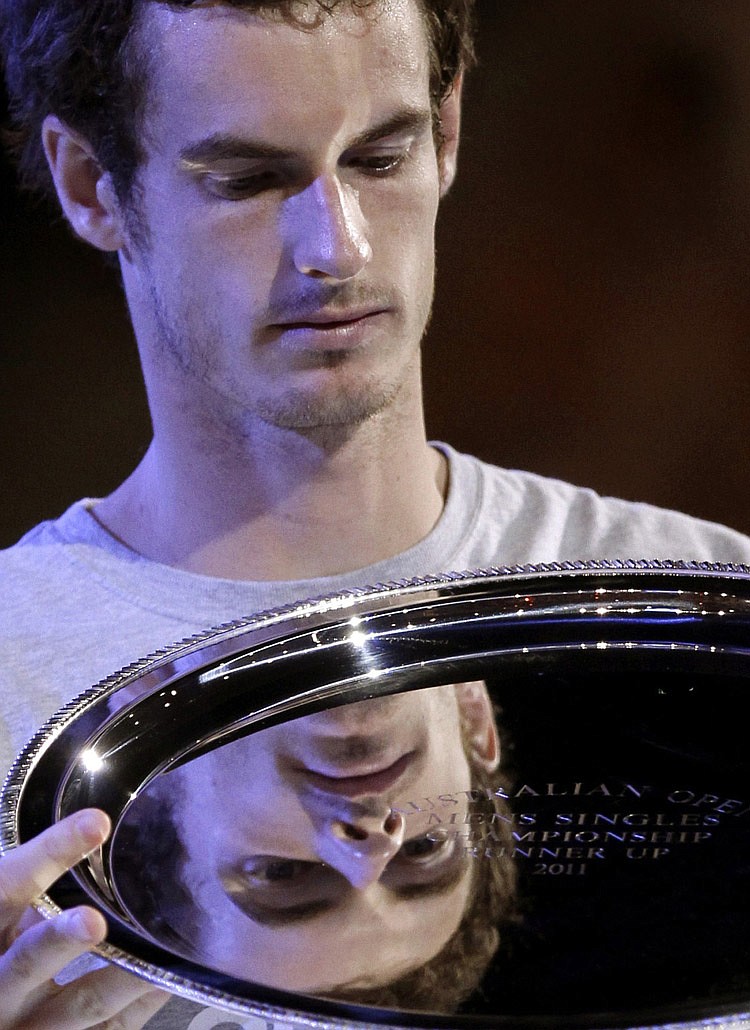Even if you strapped Andy Murray to a table and forced him to listen for 48 hours straight to Peter, Paul and Mary, it's a safe bet he still wouldn't grimace and wince quite so agonizingly as he did in losing the Australian Open final to Novak Djokovic.
Please, Andy, give the theatrics and misery a rest next time.
Murray has the tennis tools to win his first Grand Slam title and perform the much-needed exorcism of the ghost of Fred Perry. How liberating it would be to read the last rites for that threadbare factoid that the last British man to lift a Grand Slam singles trophy was Perry at the U.S. Open in 1936, when "Gone With The Wind" first hit bookstores.
Given the pounding that Rafael Nadal inflicts on his injury-prone body and the comparative decline of Roger Federer (it is still too early to declare that the Swiss emperor has no clothes), Murray can hope there will be other majors where his path to the final will open as invitingly as it did in Melbourne. On hard courts, the likes of Alexandr Dolgopolov and David Ferrer, his quarterfinal and semifinal opponents, should not for the foreseeable future be insurmountable obstacles for a player of Murray's talents.
But his attitude needs to change. So gloomy. So negative. Murray hasn't won a set in his three Grand Slam finals, the previous of which were both against Federer. The reason for that is largely mental, not physical. It is a problem of mood and maturity, not of first service percentages or any glaring weakness in his forehand.
The excruciating grimaces and snarls of anger, the expletives and quickly slumped shoulders. Murray's moodiness isn't just demeaning, it is exhausting. He expends so much energy beating himself up, energy that could be channeled on winning. "Focus!" "Fight!" (plus another unprintable F-word) Murray cries out. But his body language yells, "I'm losing and do not believe that I can recover."
Murray has become adept at fending off the inevitable questions about whether Perry's ghost and the weight of history prevent him from playing his best tennis when it really counts. He tries not to dwell on it, he says.
"I don't want to get myself sort of too worked up," Murray said before doing exactly that in losing to Djokovic.
One sympathizes. The British, perhaps because they aren't the dominant force in world sports that they believe should be their divine right, do pile huge expectations on Murray, as they did with Tim Henman before him. That cannot be simple to handle, no matter how much Murray swats it away and says he wants to win for himself and not to free his nation of its interminable wait for a successor to Perry.
But tough. The consistent lack of Grand Slam success by British men isn't his fault, but it is the way it is. Murray needs to find a way of making that history work for him, not against him, of making it inspirational, not constricting. Perhaps part of the solution could be finding a coach who can help him better accentuate the positive and not let him forget that he is, for all his disappointments, still young enough to give himself many more shots at a major title and to learn from his mistakes.
True, Djokovic was inspired Sunday, chasing every ball as if life itself depended on it. Yet Murray had chances and half-chances and won three of his four break points. They played the first set with the intensity of stags locking antlers in Murray's native Scotland. But when, at 5-4 to Djokovic, Murray double-faulted and then netted a backhand after a 39-shot point and went on to lose the set, the flame of belief flickered and eventually was extinguished.
Unlike Murray, who was born just one week earlier than him 23 years ago, Djokovic seems to draw strength from being an ambassador for his country, Serbia, and from its troubled, war-scarred past. Helping Serbia win the Davis Cup in December did wonders for his confidence and desire. There is a lesson there for other players who argue that the venerable tournament is too taxing, too inconvenient and should be gutted or allowed to die.
In his victory speech Sunday, where he also asked people to spare a thought for victims of Australia's floods, Djokovic dedicated his second Grand Slam trophy Down Under to his countrymen.
"There has been a tough period for our people in Serbia," he said. "But we are trying every single day to present our country in the best possible way."
It was thoughtful, considerate and mature stuff from a player who had built something of a reputation of being a hypochondriac, quick with excuses for defeats and withdrawals, and of playing the clown.
But now, increasingly, Murray looks like the flaky one.
John Leicester is an international sports columnist for the Associated Press. Write to him at [email protected]

